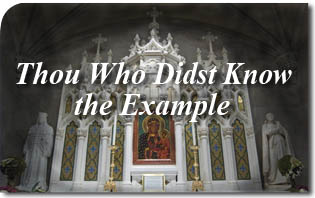 There is no one in the Catholic world who has not heard of the famous Marian shrine of Czestochowa in Poland.
There is no one in the Catholic world who has not heard of the famous Marian shrine of Czestochowa in Poland.
Because of the continuous flow of pilgrims to it, which the disgusting campaign of the atheists has not managed to reduce, the shrine was usually so full that the Catholic population had determined to build a chapel in a new neighborhood of the city. Naturally, it was not possible to carry out such an undertaking in a Communist regime without the approval of the authorities. And even though the request had the approval of 90 percent of the faithful, it was ignored by the public authorities. Nevertheless, the parish priest having jurisdiction there showed himself to be up to the heights of his sacred ministry; in a private house, he improvised a tiny chapel and established a center for the teaching of catechism.
This achievement, naturally of tiny proportions, unleashed the fury of the police, who searched the house and confiscated it. A little later, the authorities resolved to demolish it, obviously a sign of their execration of the religious use to which it was being put.
Without any fear, the parish priest then asked that another place be put at his disposal. As might be expected, this petition was also ignored. Shortly thereafter, the authorities sent tractors to sweep away the “cursed” house.
Imagine the surprise of those in charge of the demolition when they discovered that the whole edifice was full of Catholics being led by their pastor in prayer. It was necessary either to carry out the demolition with the consequent death of all those within or else to give up the project. Waiting until the edifice was empty in order to tear it down was impractical, for the Catholics remained there day and night imploring the aid of Our Lady.
Before so much faith and firmness, the tractors retreated. The authorities did not dare commit the crime for fear of making public opinion indignant.
And there is more: After bitter arguments with the local Bishops, the Communists decided it would be prudent to concede to this parish priest another edifice for his chapel and his center of catechism.
* * *
Among the many churches (some of them disgusting) which our epoch has constructed, I know of none so outstanding as this one, for it was born with an antecedent episode worthy of the highest epochs of the life of the Church. The intransigent courage of this priest in defense of the rights of the good people of Jesus Christ made the claws of the Communist dragon retract.
This incident lends itself to all kinds of appreciative expressions suitable for bringing out the brilliance of its splendor, but the limits of this article will not permit it.
I will limit myself to a very synthesized commentary, but one which will have the merit of being practical.
The conduct of the bold parish priest and his admirable flock prove that the only policy which turns out well is that of not making any concessions. If that pastor had been a follower of the famous maxim of “give in a little bit in order not to lose all,” he would have been reduced to silence and his flock would have been dispersed.
He faced the adversary, and there, still standing, is his chapel, and there still functioning, his catechetical center. It is not licit merely to admire episodes like this. It is necessary to imitate them — above all in a country like ours in which the law guarantees the freedom of the Church.
On Judgment Day, God will ask us what use we have made, in our combats against evil, of the good example of this courageous parish priest. We who have had the freedom which was lacking to him…
And even before that, History will ask us the same question, interrogating us about why we did not have the same boldness in the face of corruption and impiety that this priest showed in the face of the threat of the Communist tractors.
Neither sadness nor bitterness is lacking in this reflection. In spite of that, I register it here, with the intention of stirring up dormant energies and rebuking cowardly tactics.
If I did not do so, it is I myself whom God would ask on the Day of Judgment: “Thou who didst know the noble example of that my outstanding priest, why didst thou not publish it.”
The preceding article was originally published in the Folha de S.Paulo, on January 20th, 1974. It has been translated and adapted for publication without the author’s revision.
–Ed.

